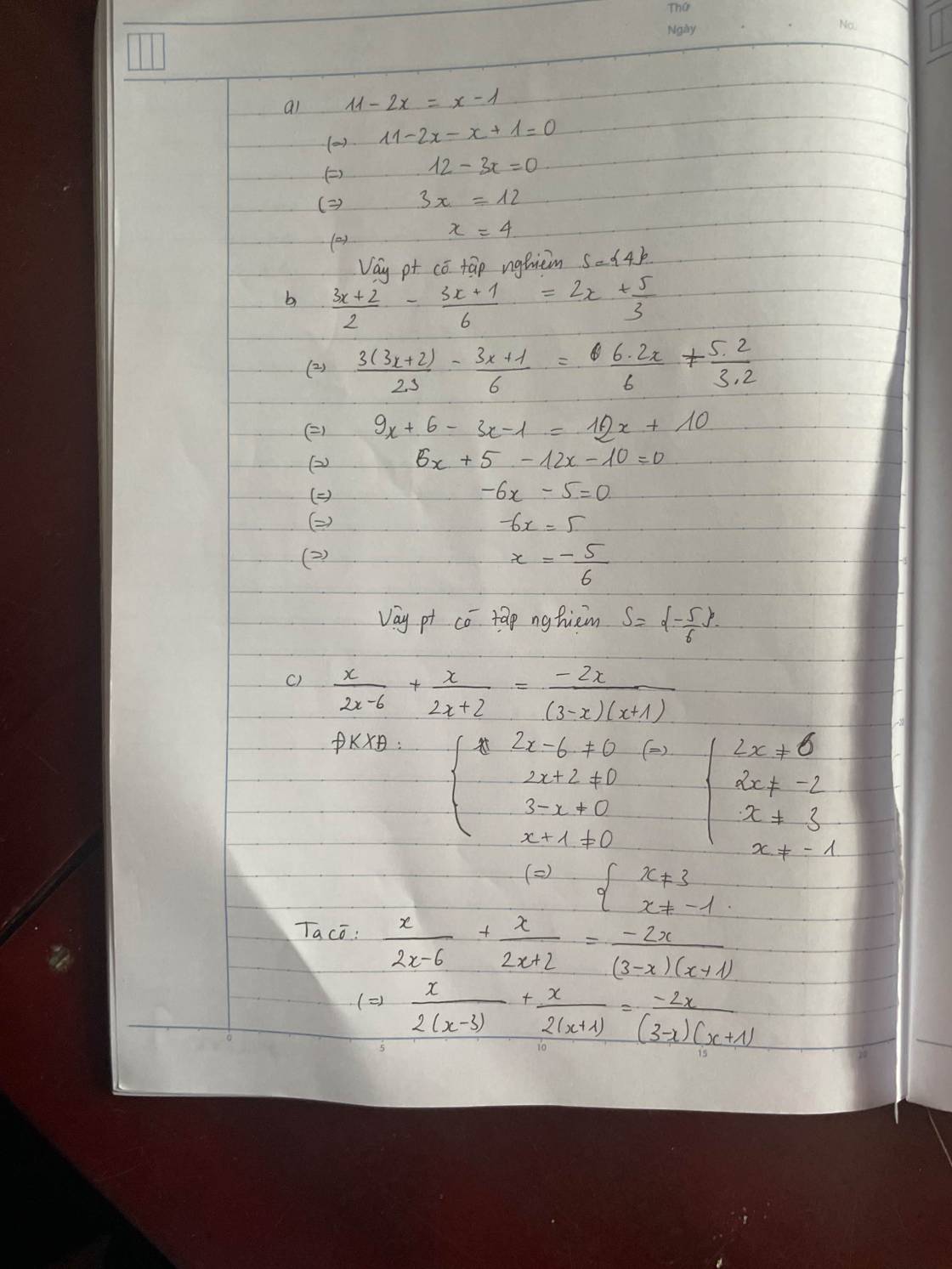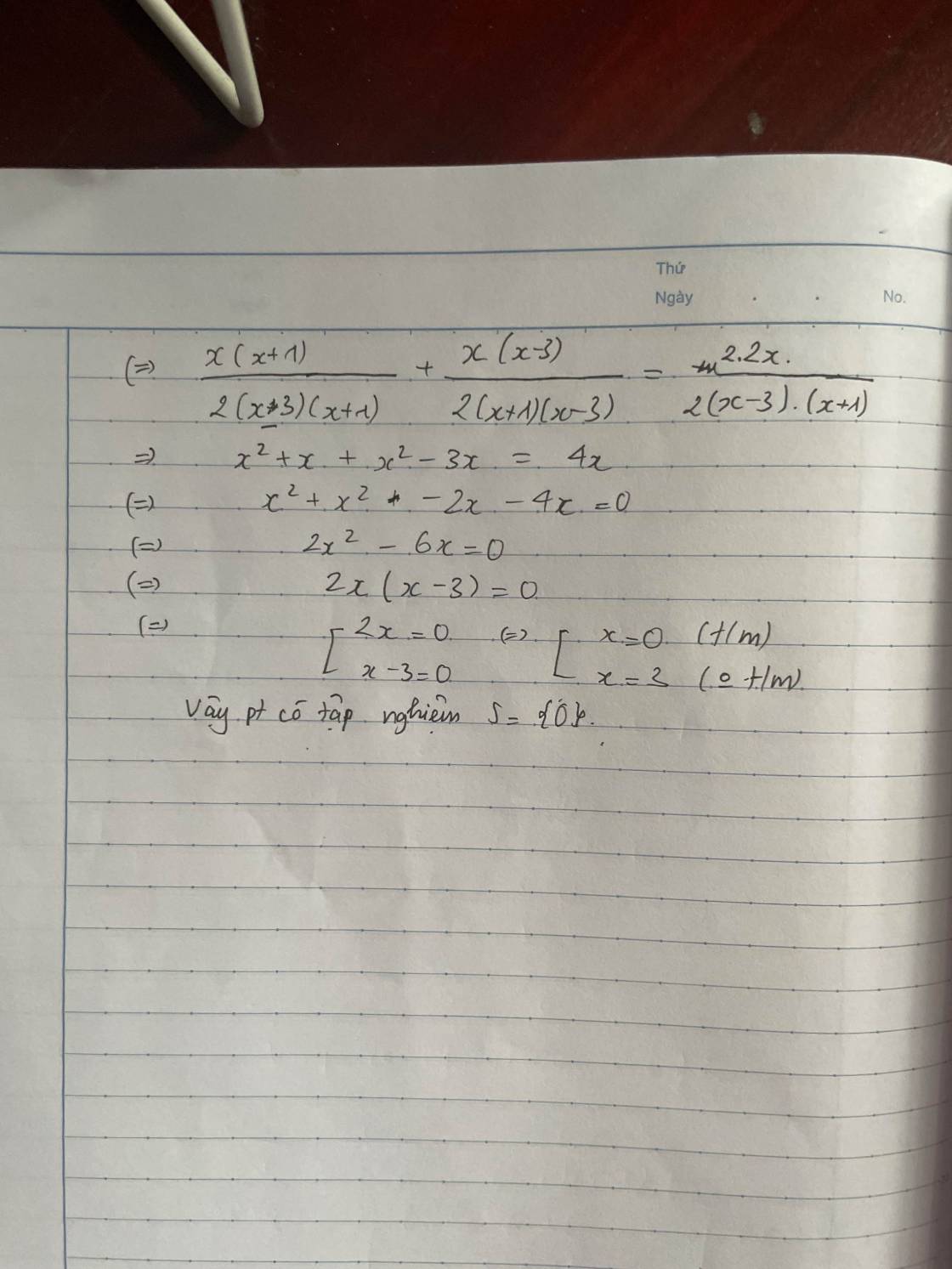Hãy nhập câu hỏi của bạn vào đây, nếu là tài khoản VIP, bạn sẽ được ưu tiên trả lời.

a: =>-3x=-12
=>x=4
b: =>3(3x+2)-3x-1=12x+10
=>9x+6-3x-1=12x+10
=>12x+10=6x+5
=>6x=-5
=>x=-5/6
c: =>x(x+1)+x(x-3)=4x
=>x^2+x+x^2-3x-4x=0
=>2x^2-6x=0
=>2x(x-3)=0
=>x=3(loại) hoặc x=0(nhận)

1:
a: =>(|x|+4)(|x|-1)=0
=>|x|-1=0
=>x=1; x=-1
b: =>x^2-4>=0
=>x>=2 hoặc x<=-2
d: =>|2x+5|=2x-5
=>x>=5/2 và (2x+5-2x+5)(2x+5+2x-5)=0
=>x=0(loại)

a) ĐKXĐ: x≠-5
Ta có: \(\dfrac{2x-5}{x+5}=4\)
\(\Leftrightarrow2x-5=4\left(x+5\right)\)
\(\Leftrightarrow2x-5=4x+20\)
\(\Leftrightarrow2x-5-4x-20=0\)
\(\Leftrightarrow-2x-25=0\)
\(\Leftrightarrow-2x=25\)
hay \(x=\dfrac{-25}{2}\)(nhận)
Vậy: \(S=\left\{-\dfrac{25}{2}\right\}\)
b) ĐKXĐ: x≠0
Ta có: \(\dfrac{x^2-4}{x}=\dfrac{2x+3}{2}\)
\(\Leftrightarrow2\left(x^2-4\right)=x\left(2x+3\right)\)
\(\Leftrightarrow2x^2-8=2x^2+3x\)
\(\Leftrightarrow2x^2-8-2x^2-3x=0\)
\(\Leftrightarrow-3x-8=0\)
\(\Leftrightarrow-3x=8\)
hay \(x=\dfrac{-8}{3}\)(nhận)
Vậy: \(S=\left\{-\dfrac{8}{3}\right\}\)
c) ĐKXĐ: \(x\notin\left\{\dfrac{1}{2};-5\right\}\)
Ta có: \(\dfrac{2x+3}{2x-1}=\dfrac{x-3}{x+5}\)
\(\Leftrightarrow\left(2x+3\right)\left(x+5\right)=\left(2x-1\right)\left(x-3\right)\)
\(\Leftrightarrow2x^2+10x+3x+15=2x^2-6x-x+3\)
\(\Leftrightarrow2x^2+13x+15=2x^2-7x+3\)
\(\Leftrightarrow2x^2+13x+15-2x^2+7x-3=0\)
\(\Leftrightarrow20x+12=0\)
\(\Leftrightarrow20x=-12\)
hay \(x=-\dfrac{3}{5}\)(nhận)
Vậy: \(S=\left\{-\dfrac{3}{5}\right\}\)
d) ĐKXĐ: \(x\notin\left\{-7;\dfrac{3}{2}\right\}\)
Ta có: \(\dfrac{3x-2}{x+7}=\dfrac{6x+1}{2x-3}\)
\(\Leftrightarrow\left(3x-2\right)\left(2x-3\right)=\left(x+7\right)\left(6x+1\right)\)
\(\Leftrightarrow6x^2-9x-4x+6=6x^2+x+42x+7\)
\(\Leftrightarrow6x^2-13x+6=6x^2+43x+7\)
\(\Leftrightarrow6x^2-13x+6-6x^2-43x-7=0\)
\(\Leftrightarrow-56x-1=0\)
\(\Leftrightarrow-56x=1\)
hay \(x=-\dfrac{1}{56}\)(nhận)
Vậy: \(S=\left\{-\dfrac{1}{56}\right\}\)

a)5(x-6)=4(3 -2x)
5x-30=12-8x
5x -8x=30+12
-3x=42
x=42 : (-3)
x=-14
a) 2x(x - 3) + 5(x - 3) = 0 ⇔ (x - 3)(2x + 5) = 0 ⇔ x - 3 = 0 hoặc 2x + 5 = 0
1) x - 3 = 0 ⇔ x = 3
2) 2x + 5 = 0 ⇔ 2x = -5 ⇔ x = -2,5
Vậy tập nghiệm của phương trình là S = {3;-2,5}
b) (x2 - 4) + (x - 2)(3 - 2x) = 0 ⇔ (x - 2)(x + 2) + (x - 2)(3 - 2x) = 0
⇔ (x - 2)(x + 2 + 3 - 2x) = 0 ⇔ (x - 2)(-x + 5) = 0 ⇔ x - 2 = 0 hoặc -x + 5 = 0
1) x - 2 = 0 ⇔ x = 2
2) -x + 5 = 0 ⇔ x = 5
Vậy tập nghiệm của phương trình là S = {2;5}
c) x3 – 3x2 + 3x – 1 = 0 ⇔ (x – 1)3 = 0 ⇔ x = 1.
Vậy tập nghiệm của phương trình là x = 1
d) x(2x - 7) - 4x + 14 = 0 ⇔ x(2x - 7) - 2(2x - 7) = 0
⇔ (x - 2)(2x - 7) = 0 ⇔ x - 2 = 0 hoặc 2x - 7 = 0
1) x - 2 = 0 ⇔ x = 2
2) 2x - 7 = 0 ⇔ 2x = 7 ⇔ x = 72
Vậy tập nghiệm của phương trình là S = {2;72}
e) (2x – 5)2 – (x + 2)2 = 0 ⇔ (2x - 5 - x - 2)(2x - 5 + x + 2) = 0
⇔ (x - 7)(3x - 3) = 0 ⇔ x - 7 = 0 hoặc 3x - 3 = 0
1) x - 7 = 0 ⇔ x = 7
2) 3x - 3 = 0 ⇔ 3x = 3 ⇔ x = 1
Vậy tập nghiệm phương trình là: S= { 7; 1}
f) x2 – x – (3x - 3) = 0 ⇔ x2 – x – 3x + 3 = 0
⇔ x(x - 1) - 3(x - 1) = 0 ⇔ (x - 3)(x - 1) = 0
⇔ x = 3 hoặc x = 1
Vậy tập nghiệm của phương trình là S = {1;3}

Bài 1:
a.
$(4x^2+4x+1)-x^2=0$
$\Leftrightarrow (2x+1)^2-x^2=0$
$\Leftrightarrow (2x+1-x)(2x+1+x)=0$
$\Leftrightarrow (x+1)(3x+1)=0$
$\Rightarrow x+1=0$ hoặc $3x+1=0$
$\Rightarrow x=-1$ hoặc $x=-\frac{1}{3}$
b.
$x^2-2x+1=4$
$\Leftrightarrow (x-1)^2=2^2$
$\Leftrightarrow (x-1)^2-2^2=0$
$\Leftrightarrow (x-1-2)(x-1+2)=0$
$\Leftrightarrow (x-3)(x+1)=0$
$\Leftrightarrow x-3=0$ hoặc $x+1=0$
$\Leftrightarrow x=3$ hoặc $x=-1$
c.
$x^2-5x+6=0$
$\Leftrightarrow (x^2-2x)-(3x-6)=0$
$\Leftrightarrow x(x-2)-3(x-2)=0$
$\Leftrightarrow (x-2)(x-3)=0$
$\Leftrightarrow x-2=0$ hoặc $x-3=0$
$\Leftrightarrow x=2$ hoặc $x=3$
2c.
ĐKXĐ: $x\neq 0$
PT $\Leftrightarrow x-\frac{6}{x}=x+\frac{3}{2}$
$\Leftrightarrow -\frac{6}{x}=\frac{3}{2}$
$\Leftrightarrow x=-4$ (tm)
2d.
ĐKXĐ: $x\neq 2$
PT $\Leftrightarrow \frac{1+3(x-2)}{x-2}=\frac{3-x}{x-2}$
$\Leftrightarrow \frac{3x-5}{x-2}=\frac{3-x}{x-2}$
$\Rightarrow 3x-5=3-x$
$\Leftrightarrow 4x=8$
$\Leftrightarrow x=2$ (không tm)
Vậy pt vô nghiệm.

\(a,3x-2\left(x-3\right)=0\\ \Leftrightarrow3x-2x+6=0\\ \Leftrightarrow x=-6\\ b,\left(x+1\right)\left(2x-3\right)=\left(2x-1\right)\left(x+5\right)\\ \Leftrightarrow2x^2+2x-3x-3=2x^2-x+10x-5\\ \Leftrightarrow2x^2-x-3=2x^2+9x-5\\ \Leftrightarrow10x-2=0\\ \Leftrightarrow x=\dfrac{1}{5}\\ c,ĐKXĐ:x\ne\pm1\\ \dfrac{2x}{x-1}-\dfrac{x}{x+1}=1\\ \Leftrightarrow\dfrac{2x\left(x+1\right)}{\left(x+1\right)\left(x-1\right)}-\dfrac{x\left(x-1\right)}{\left(x+1\right)\left(x-1\right)}-\dfrac{\left(x+1\right)\left(x-1\right)}{\left(x+1\right)\left(x-1\right)}=0\\ \Leftrightarrow\dfrac{2x^2+2x-x^2+x-x^2+1}{\left(x+1\right)\left(x-1\right)}=0\)
\(\Rightarrow3x+1=0\\ \Leftrightarrow x=-\dfrac{1}{3}\left(tm\right)\)
\(d,\left(2x+3\right)\left(3x-5\right)=0\\ \Leftrightarrow\left[{}\begin{matrix}2x+3=0\\3x-5=0\end{matrix}\right.\\ \Leftrightarrow\left[{}\begin{matrix}x=-\dfrac{3}{2}\\x=\dfrac{5}{3}\end{matrix}\right.\\ e,ĐKXĐ:x\ne\pm2\\ \dfrac{x-2}{x+2}-\dfrac{3}{x-2}=\dfrac{2\left(x-11\right)}{x^2-4}\\ \Leftrightarrow\dfrac{\left(x-2\right)^2}{\left(x-2\right)\left(x+2\right)}-\dfrac{3\left(x+2\right)}{\left(x-2\right)\left(x+2\right)}-\dfrac{2x-22}{\left(x-2\right)\left(x+2\right)}=0\)
\(\Leftrightarrow\dfrac{x^2-4x+4-3x-6-2x+22}{\left(x-2\right)\left(x+2\right)}=0\\ \Rightarrow x^2-9x+20=0\\ \Leftrightarrow\left(x^2-5x\right)-\left(4x-20\right)=0\\ \Leftrightarrow x\left(x-5\right)-4\left(x-5\right)=0\\ \Leftrightarrow\left(x-4\right)\left(x-5\right)\\ \Leftrightarrow\left[{}\begin{matrix}x=4\left(tm\right)\\x=5\left(tm\right)\end{matrix}\right.\)


a, \(\frac{1+2x-5}{6}=\frac{3-x}{4}\)
\(\frac{4+8x-20}{24}=\frac{18-6x}{24}\)
\(-16-8x=18-6x\)
\(-16-8x-18+6x=0\)
\(-34-2x=0\)
\(2x=-34\Leftrightarrow x=-17\)
b, \(\frac{x+3}{x+1}+\frac{x-2}{x}=2\)ĐKXĐ : x \(\ne\)-1 ; 0
\(\frac{x^2+3x}{x^2+x}+\frac{x^2-x-2}{x^2+x}=\frac{2x^2+2x}{x^2+x}\)
\(x^2+3x+x^2-x-2=2x^2+2x\)
\(2x^2+2x-2=2x^2+2x\)
\(2x^2+2x-2x^2-2x-2=0\)
\(-2\ne0\) Nên phuwong trình vô nghiệm. (xem lại hộ)